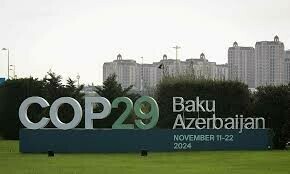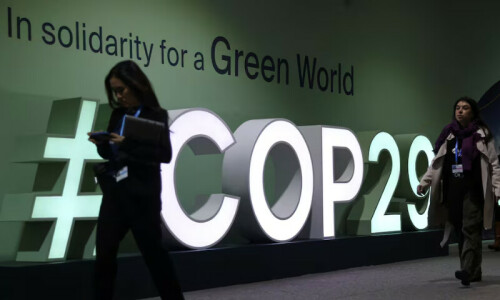BAKU: As it requires $348 billion by 2030 for its climate-resilient projects, Pakistan’s climate minister Romina Khurshid Alam announced the launch of its carbon market policy on Saturday to attract “green investments” and achieve “environmental sustainability” on the sidelines of COP29 in Baku.
Speaking at a session at the Pakistan Pavilion, the prime minister’s climate aide said the country was ready to collaborate with local and international stakeholders for the development of carbon markets to attract investment for its climate goals.
The carbon market framework has come under fire for ‘greenwashing’ and rights abuses in several parts of the world. At COP29, climate activists and observers see them as one of the ‘false solutions’ and there have been regular protests against it.
Observers, however, say developing countries will be able to get some money by trading carbon credits to support their adaptation and mitigation projects, but this strategy will not work in the long term.
New policy to attract ‘green investments’ launched; carbon credits garner criticism, seen as an attempt by wealthy nations to shirk responsibility
“By participating in such markets, Pakistan can incentivise businesses and industries to adopt cleaner technologies and practices,” a statement issued by the climate ministry quoted Romina Alam as saying.
She said Pakistan would be able to monetise the reduction of emissions, and the “intended establishment of a robust carbon market mechanism would align well with the country’s commitment to the Paris Agreement”.
Explaining the nature of possible carbon markets in Pakistan, the PM’s climate aide said “we aim to accelerate clean technology deployment and attract investment in sectors and projects with significant emissions reduction potential, including energy, agriculture, waste management, and forestry”.
She said the country was ready to work with “partners and collaborators interested in jointly setting up carbon markets to make this national carbon market policy not just functional but transformative as well”.
According to Romina Alam, these markets would pave the way for a more sustainable and resilient future and were a “win-win situation” for the country and those interested in setting up these markets.
She highlighted that a regulated and transparent carbon pricing compliance market (CM) and voluntary carbon market (VCM) in Pakistan would invite the private sector to jump in and pitch greenfield projects based on climate resilience and adaptability.
The PM’s aide hinted at taking other countries along in this initiative. “We would be more focused on drawing the benefits of COP29 collectively for nations which emit less through cooperation and collaboration in the carbon market crediting,” she added.
Climate Change Secretary Aisha Moriani said the policy was an outcome of “two years of rigorous hard work” and called it a framework designed to operationalise carbon markets as an important mechanism for meeting Pakistan’s climate and development objectives.
“It set(s) a clear regulatory framework for the creation and governance of both voluntary and compliance carbon market activities in Pakistan, following international requirements and good practice,” she added.
Carbon market
Erika Lennon, senior attorney at the Center for International Environmental Law, told Dawn that Article 6 of the Paris Agreement “allows for cooperative approaches”, such as carbon market. There are different parts of this article, but Articles 6.2, 6.4, and 6.8 are mostly talked about: Article 6.8 is a non-market approach and “there’s a lot in there about nature”.
The other two pertain to market mechanisms and carbon markets are set up under Article 6.4 “…in many ways it’s sort of seen as replacement of the Clean Development Mechanism, which was under the Kyoto Protocol.
“And so it’s a mechanism that will allow countries and companies to buy emissions reductions, credits or offsets,” Erika Lennon added.
She said progress on carbon markets had been stuck for many years because they “aren’t actually delivering climate action that is needed”.
“They’re not really a solution for climate finance because they’re not climate financed and they’re not really a solution for emissions reductions,” she said, calling this initiative a perpetuation of fossil fuels.
She said developing countries were being sold these markets as a solution by wealthy countries, which instead of providing the money they owed to the Global South were trying to shirk their responsibility.
“They’re obligated to provide climate finance and they need to do it,” she added.
Adil Najam, the WWF President, told Dawn that these markets were “a small part of the solution”, but it was not a silver bullet. “Unless all countries agree to remove their emissions this approach is not going to work,” he added.
This story was produced as part of the 2024 Climate Change Media Partnership, a journalism fellowship organised by Internews’ Earth Journalism Network and the Stanley Center for Peace and Security.
Published in Dawn, November 17th, 2024













































Dear visitor, the comments section is undergoing an overhaul and will return soon.